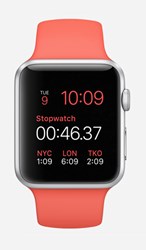Apple Watch Utilized In Chemotherapy Pilot Program

By Christine Kern, contributing writer

London’s King’s College Hospital is using the Apple Watch to monitor chemo patients.
King’s College Hospital in London is running a pilot program using the Apple Watch to monitor a handful of chemotherapy patients. The desired outcome is to help patients follow the appropriate medication regimen and track and share their symptoms and temperature readings.
As Business Solutions Magazine reports, the pilot program allows patients to receive medication reminders using their Apple Watch in conjunction with a chemotherapy app built by Medopad. Medopad CEO Rich Khatib explains, “The doctors who helped us to develop the app at King’s are so excited. The tricky thing is how to integrate HealthKit information into the systems that doctors and hospitals are using, but Medopad takes care of this.
“It is clear that treatment and patient monitoring must improve if we are to continue our global fight against cancer. This Apple Watch application helps by improving how patients monitor their illnesses on a daily basis. Individuals can directly contribute to their own treatment regimens and regain the feeling of control, a vital component of dealing with challenging illnesses.”
A limited supply of the Apple Watch has resulting in only a handful of them available for the King’s College trial, but Medopad is planning to purchase a couple hundred devices with that expense passed on to the patients. Medopad is currently paying the $349 price tag for the patients in the pilot.
The pilot marks one of the first times a hospital will use the Apple Watch for large-scale treatment purposes, as European Medical Device Technology points out. According to The Advisory Board Company, Apple Watch is being used to reduce patients’ high blood pressure through medication adherence and lifestyle changes at Ochsner Health System. MD Anderson Cancer Center plans to adopt the Apple Watch for a pilot similar to the King’s College Hospital program.
“Hospitals certainly have an interest in tracking patients after discharge, because there are certain risk factors associated with chemotherapy and they don’t want them coming back to the hospital,” Greg Caressi, senior vice president, healthcare and life sciences for Frost & Sullivan, told European Medical Device Technology.
The pilot is also a way to reduce costs while maintaining quality of care, according to Dan Vahdat, Medopad’s CTO. “The data is valuable from a clinical and personal perspective, but also for hospitals searching for innovative ways to reduce operational costs while improving overall care levels. The data can also be leveraged by pharmaceutical organizations looking for real-world insight into the effectiveness of specific drugs.”
Will the Apple Watch be the next biggest thing for healthcare? Only time will tell, but Eric Topol, Scripps cardiologist and prominent healthcare futurist, told The Advisory Board that hospitals are “in an [Apple Watch] marketing race,” and in an healthcare system where patients are taking increasing control over their own treatment and care, there is certainly reason to be optimistic.
